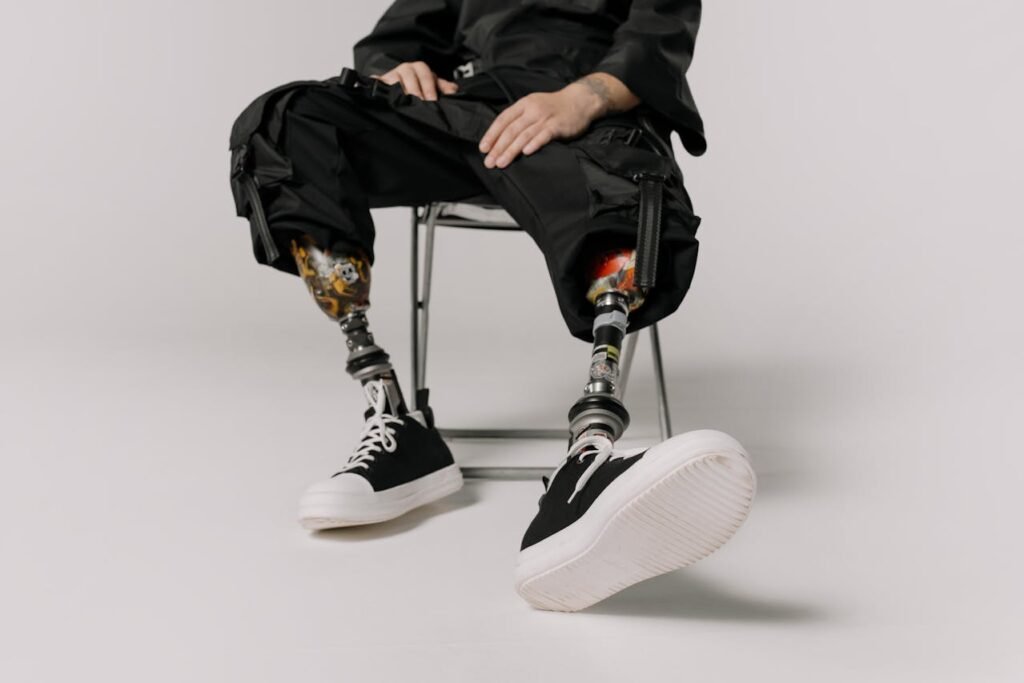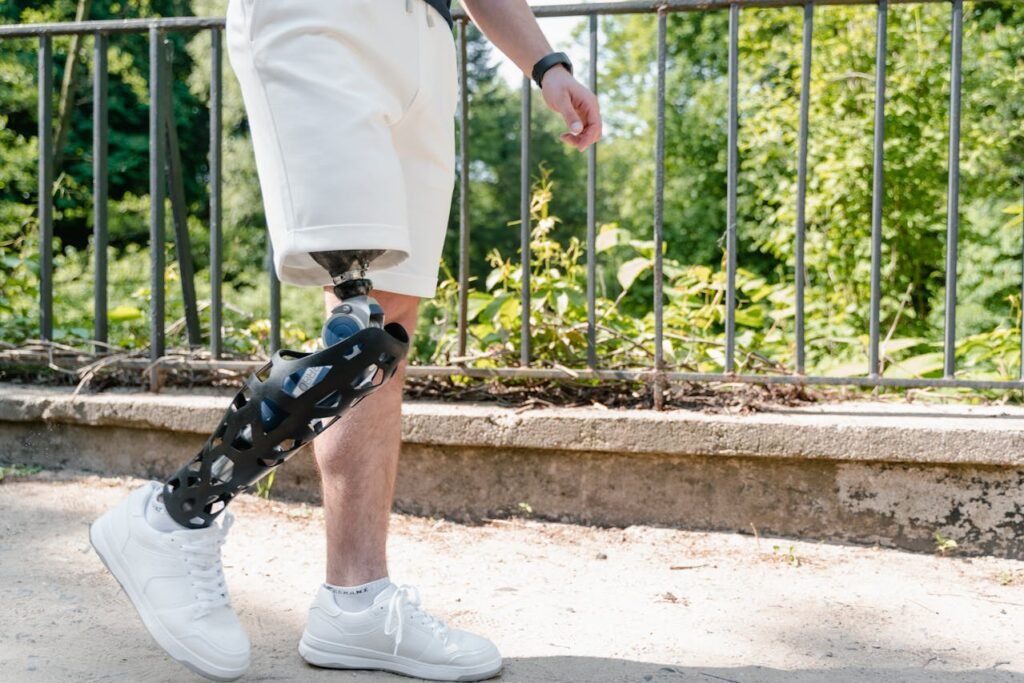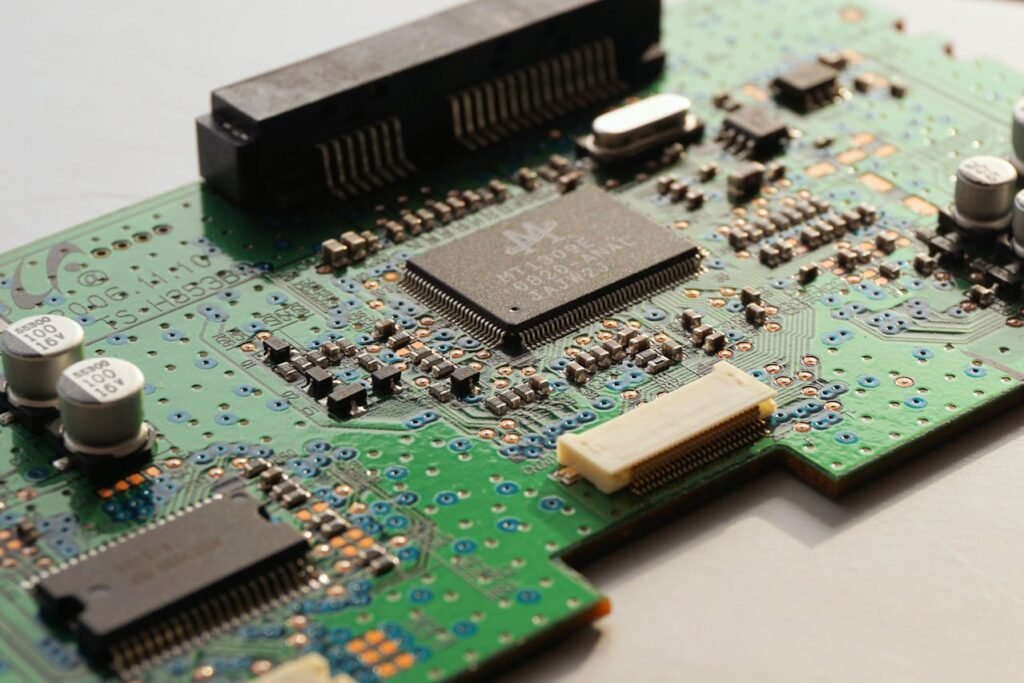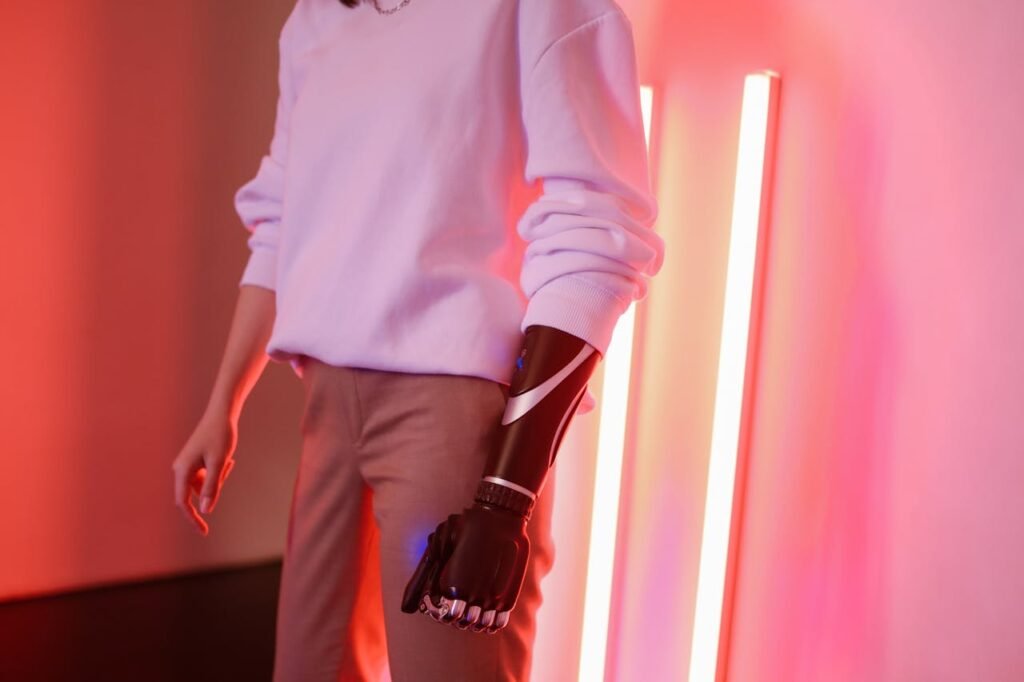Prosthetic technology has come a long way, evolving from simple mechanical devices to advanced solutions powered by cutting-edge electronics. Yet, amidst this wave of innovation, another quiet revolution is underway—battery-free prosthetics. These groundbreaking devices are redefining what’s possible in the world of assistive technology by offering simplicity, reliability, and sustainability without compromising functionality.
At Robobionics, we believe in exploring every avenue of innovation to make prosthetics more accessible and user-friendly. Battery-free prosthetics stand out as a game-changing option, particularly for individuals seeking lightweight, low-maintenance alternatives that still deliver exceptional performance.
Understanding Battery-Free Prosthetics
Battery-free prosthetics are devices designed to function without relying on rechargeable or disposable power sources. Instead of batteries, these prosthetics harness mechanical energy, body power, or external forces to operate. They represent a shift towards minimalism, focusing on efficient design and practical utility rather than complex electronics.
How Battery-Free Prosthetics Work
The key to battery-free prosthetics lies in their reliance on non-electrical systems to perform essential functions. For example, a body-powered prosthetic hand uses a system of cables and harnesses that translate shoulder or arm movements into grip and release actions.
The user’s own physical energy powers the device, eliminating the need for external energy sources.
These prosthetics are often simpler in construction, yet they offer robust performance for basic and moderate tasks. Advances in materials science and engineering have made battery-free designs more responsive and versatile than ever before.
Why Choose Battery-Free Prosthetics?
The appeal of battery-free prosthetics lies in their combination of reliability, affordability, and sustainability. Unlike electronic devices, they don’t require regular charging or battery replacements, making them ideal for users in remote areas or those seeking a hassle-free solution.
They are also incredibly lightweight, which reduces strain during extended wear. For individuals who prioritize simplicity and durability over high-tech features, battery-free prosthetics offer a compelling option that meets both functional and practical needs.

The Science Behind Battery-Free Prosthetics
At their core, battery-free prosthetics rely on mechanical systems to perform actions. These systems typically include cables, pulleys, springs, and harnesses, which translate the user’s body movements into functional outputs. For example:
Advancements in materials science have further enhanced the efficiency of these systems. Modern components are designed to reduce friction and optimize energy transfer, ensuring smoother, more intuitive operation for the user.
Benefits of Simplicity
The straightforward design of battery-free prosthetics is one of their most significant advantages. Without reliance on electronics or batteries, these devices are inherently less prone to technical failures. This simplicity translates into several practical benefits:
With fewer components to manage, users experience minimal downtime and reduced repair costs. The intuitive nature of these devices allows for faster learning and adaptation, particularly for first-time prosthetic users.
Battery-free designs provide consistent performance in environments where power access may be limited or non-existent.
The Role of Innovation in Battery-Free Designs
While simplicity defines battery-free prosthetics, innovation drives their evolution. Advances in engineering have led to designs that are more responsive, customizable, and efficient than ever before. For example:
Innovation also extends to aesthetics, with sleek, ergonomic designs that enhance comfort and confidence. These features ensure that battery-free prosthetics meet both functional and emotional needs, offering a holistic solution for users.
Advantages of Battery-Free Prosthetics
Battery-free prosthetics provide unique benefits that set them apart from their electronic counterparts. These advantages are particularly significant for users seeking dependable solutions for daily life.
Durability and Low Maintenance
Without electronic components, battery-free prosthetics are less prone to breakdowns caused by water damage, electrical failure, or software glitches. Their simpler design translates into fewer moving parts that can wear out, reducing the frequency and cost of maintenance.
For users in challenging environments or those with limited access to repair services, this durability is a major advantage.
Accessibility and Affordability
Battery-free prosthetics are often more affordable than their electronic counterparts, both in initial cost and ongoing expenses. By eliminating the need for charging equipment or replacement batteries, users save on long-term operational costs.
This makes them an attractive option for individuals and healthcare systems in developing regions where affordability and accessibility are critical.
Lightweight and Comfortable
Because they don’t require batteries, circuits, or motors, battery-free prosthetics are significantly lighter than electronic versions. This reduces user fatigue and makes the devices more comfortable for extended wear.
For individuals with physical limitations or sensitivity to weight, this can greatly enhance their quality of life.
Innovations in Battery-Free Prosthetics
Battery-free prosthetics are not limited to basic mechanical designs. Recent advancements in materials, engineering, and biomechanics have transformed these devices into sophisticated tools capable of addressing diverse needs.
These innovations are pushing the boundaries of what battery-free prosthetics can achieve, making them a viable alternative to powered devices for many users.
Enhanced Control Mechanisms
Traditional body-powered prosthetics relied on simple cable and harness systems, which required significant effort to operate.
Today’s designs incorporate advanced pulley systems and biomechanical enhancements that reduce the force needed to perform tasks. This makes the devices easier to use and allows for greater precision, even for delicate movements.
For example, modern body-powered hands now feature improved grip strength and the ability to hold objects with varying pressure levels. These advancements enable users to handle everyday tasks, such as holding utensils or using tools, with greater ease and confidence.
Advanced Materials for Better Performance
The choice of materials has a profound impact on the functionality and durability of battery-free prosthetics. Lightweight, high-strength materials such as carbon fiber and advanced polymers make these devices both robust and comfortable.
These materials are not only resistant to wear and tear but also allow for sleek, ergonomic designs that enhance the user experience.
Additionally, materials with elastic properties enable prosthetics to mimic natural movement more closely, providing a more intuitive feel for the user. This is especially important for tasks that require dexterity or repetitive actions.

Modular and Customizable Designs
Modern battery-free prosthetics are increasingly modular, allowing users to customize their devices to meet specific needs. Interchangeable components, such as terminal devices (e.g., hooks, hands, or specialized tools), enable users to switch between functions depending on the task at hand.
For instance, a user may attach a robust hook for heavy lifting tasks and then replace it with a more delicate hand for fine motor activities. This versatility makes battery-free prosthetics adaptable to a wide range of environments and professions.
Applications of Battery-Free Prosthetics in Daily Life
Battery-free prosthetics are proving to be highly effective in various scenarios, offering practical solutions that enhance independence and mobility. Their applications extend across personal, professional, and recreational domains, demonstrating their versatility and value.
Daily Tasks Made Easier
For individuals with upper-limb loss, simple tasks like opening jars, holding utensils, or carrying bags can be challenging. Battery-free prosthetics provide reliable solutions for these activities without the need for charging or complex adjustments.
The simplicity of their operation ensures that users can focus on their tasks rather than managing their devices.
Support for Active Lifestyles
Battery-free prosthetics are particularly well-suited for users with active lifestyles or those in physically demanding professions. Their lightweight design and durability make them ideal for outdoor activities, sports, and manual labor.
Whether it’s hiking, gardening, or working on a construction site, these devices deliver the reliability and performance needed to keep up with the user’s pace.
Empowering Independence at Home
One of the most transformative applications of battery-free prosthetics is in enabling individuals to perform everyday tasks independently. From cooking and cleaning to personal grooming, these devices restore the ability to handle essential activities without assistance.
For instance, a body-powered prosthetic hand equipped with adjustable grip strength can help users hold utensils securely while preparing meals. Similarly, prosthetics with enhanced dexterity allow users to handle delicate tasks like brushing teeth or buttoning shirts.
Enhancing Mobility in Professional Settings
Battery-free prosthetics are increasingly being used to support individuals in the workplace. Their durability and low maintenance make them ideal for roles that demand physical resilience, while their simplicity ensures that users can focus on their tasks without worrying about charging or technical malfunctions.
In office environments, lightweight upper-limb prosthetics with ergonomic designs allow employees to type, write, or manage files efficiently.
For manual labor or skilled trades, prosthetics with interchangeable attachments enable users to operate tools, lift objects, or perform detailed work with precision.
Supporting Recreational Activities
Battery-free prosthetics are not limited to functional tasks—they also open doors to leisure and recreational pursuits.
Their lightweight and durable nature make them ideal for activities like sports, gardening, or playing musical instruments, allowing users to engage in hobbies that enhance their quality of life.
For example, a prosthetic leg designed for hiking can feature shock-absorbing joints to handle uneven terrain, while a prosthetic hand with specialized grips can help users hold sports equipment like tennis rackets or fishing rods.

Providing Reliability in Challenging Environments
Battery-free prosthetics are particularly effective in environments where powered devices might struggle. Their lack of reliance on batteries makes them ideal for users in remote or off-grid locations, as well as for individuals working in harsh conditions where durability is essential.
For instance, farmers or outdoor workers can benefit from robust prosthetics capable of withstanding dirt, moisture, and temperature extremes.
These devices deliver consistent performance without the need for charging or delicate handling, ensuring reliability in demanding settings.
Sustainability and the Environmental Impact of Battery-Free Prosthetics
One of the most compelling advantages of battery-free prosthetics is their positive environmental impact. Unlike their electronic counterparts, which rely on batteries and complex components that contribute to e-waste, battery-free designs offer a sustainable alternative.
Reducing E-Waste
The increasing demand for electronic devices has led to a surge in e-waste, with batteries being a significant contributor.
Battery-free prosthetics eliminate this issue entirely by relying on mechanical systems and durable materials. Users can enjoy a reliable prosthetic without the environmental cost of replacing or disposing of batteries.
For businesses and organizations focused on sustainability, offering battery-free prosthetics can align with green initiatives and corporate responsibility goals.

Longer Lifespan and Fewer Resources
Battery-free prosthetics are designed for longevity, often lasting longer than their electronic counterparts due to their simpler construction.
This reduces the need for frequent replacements, minimizing the resources required for production. Additionally, the absence of electrical components makes these prosthetics easier to repair and maintain, further extending their lifespan.
The Role of Battery-Free Prosthetics in Expanding Accessibility
Accessibility remains a critical issue in prosthetic adoption, especially in regions where access to advanced technology is limited. Battery-free prosthetics are bridging this gap by offering affordable, practical solutions that meet the needs of diverse populations.
Reaching Underserved Communities
In rural or economically disadvantaged areas, access to electricity and charging infrastructure can be inconsistent. Battery-free prosthetics are uniquely suited to these environments, providing a dependable option that doesn’t require external power sources.
This makes them an invaluable tool for expanding prosthetic care to underserved communities.
Organizations and healthcare providers can leverage battery-free prosthetics to reach individuals who might otherwise lack access to assistive devices, helping them regain mobility and independence.
Simplifying Training and Adoption
Battery-free prosthetics are easier to use and maintain, making them ideal for first-time users or those with limited access to specialized training.
Their intuitive design ensures that users can quickly learn how to operate their device, reducing the need for extensive rehabilitation or technical support.
For healthcare providers, this simplicity translates into lower training costs and shorter adaptation periods, enabling them to serve more patients efficiently.
Bridging the Gap in Rural and Remote Areas
One of the most significant barriers to prosthetic adoption in rural or remote regions is the lack of reliable electricity. Battery-powered prosthetics often require regular charging or maintenance, which can be impractical in areas with limited infrastructure.
Battery-free prosthetics eliminate this dependency, offering a reliable alternative that requires no external power source.
For businesses and healthcare providers operating in such areas, introducing battery-free solutions can significantly enhance accessibility. These devices allow individuals to regain mobility and independence without the logistical challenges associated with powered prosthetics.
Addressing Cost Barriers
For many individuals, the high cost of powered prosthetics is a deterrent to adoption. Battery-free prosthetics offer a more affordable alternative, both in initial pricing and maintenance expenses.
By eliminating the need for batteries, charging equipment, and frequent repairs, these devices significantly reduce long-term costs for users.
This affordability makes battery-free prosthetics particularly valuable in low-income settings, where even small financial barriers can prevent access to essential healthcare technologies.
Businesses that prioritize cost-effective solutions can play a critical role in making mobility solutions accessible to a broader audience.
Simplifying Adoption for First-Time Users
For individuals new to prosthetics, the complexity of powered devices can be intimidating. Battery-free prosthetics are inherently simpler, relying on mechanical systems that are easy to understand and operate.
This simplicity makes them an excellent option for first-time users, who may be more focused on regaining basic functionality than exploring advanced features.
Additionally, the intuitive nature of battery-free designs reduces the need for extensive training or technical support, making them easier to adopt and use effectively.
Enabling Independence in Disaster and Conflict Zones
In disaster or conflict zones, individuals with limb loss often face additional challenges in accessing healthcare and assistive devices.
The absence of stable infrastructure makes battery-powered prosthetics difficult to maintain, while the urgency of the situation demands quick, reliable solutions.
Battery-free prosthetics are well-suited to these environments due to their simplicity, durability, and independence from external power sources.
Organizations involved in disaster relief or humanitarian aid can deploy these devices as part of their efforts to restore mobility and dignity to affected individuals.
The Future of Battery-Free Prosthetics
The potential of battery-free prosthetics is far from fully realized. Advances in engineering, materials science, and biomechanics are opening up new possibilities for innovation, making these devices even more effective and versatile.
Integration of Smart Mechanical Systems
The next generation of battery-free prosthetics may incorporate smart mechanical systems that enhance functionality without requiring electronic components.
These innovations could include spring-loaded joints for smoother movement or self-adjusting grips that adapt to different tasks.
By combining simplicity with advanced mechanics, future battery-free prosthetics will push the boundaries of what non-powered devices can achieve.

Scaling Production for Wider Adoption
As demand for sustainable and accessible prosthetic solutions grows, scaling the production of battery-free designs will be essential.
Businesses like Robobionics are investing in technologies like 3D printing to create customizable prosthetics quickly and affordably, ensuring that more people can benefit from these innovations.
Integrating Advanced Biomechanics
The next wave of battery-free prosthetics will likely focus on enhanced biomechanical functionality. By mimicking the intricacies of natural movement, these devices can deliver smoother and more intuitive experiences for users.
Advances in spring-loaded mechanisms, dynamic joints, and energy-storing materials will allow battery-free prosthetics to replicate the fluidity of human motion more accurately.
For instance, prosthetic legs could incorporate shock-absorbing designs that improve stability on uneven terrain, while hands might use tension-adjusting mechanisms to enable precise grip control.
These innovations can expand the usability of battery-free devices across various professions, activities, and lifestyles.
Exploring Smart Mechanical Systems
One of the most promising directions for battery-free prosthetics is the integration of smart mechanical systems. These systems combine traditional mechanics with sensors and responsive components to adapt to user movements in real time, all without relying on batteries.
For example, a smart knee joint could automatically adjust tension during walking, climbing, or sitting, offering users a seamless transition between activities.
Similarly, pressure-sensitive grips could enable hands to handle delicate objects with precision while applying more force for heavier tasks.
Leveraging 3D Printing for Customization
Customization is a growing trend in prosthetics, and 3D printing is poised to revolutionize how battery-free devices are designed and manufactured.
By using this technology, businesses can create personalized prosthetics tailored to each user’s anatomy, preferences, and lifestyle.
In addition to enhancing comfort and fit, 3D printing allows for rapid prototyping and cost-efficient production, making battery-free prosthetics more accessible to a broader audience.
This flexibility also enables businesses to experiment with unique designs, such as lightweight structures or aesthetic customizations that reflect the user’s personality.
Expanding the Reach of Battery-Free Prosthetics
The future of battery-free prosthetics isn’t limited to individual users. These devices have the potential to reshape entire industries and communities by making mobility solutions more accessible and sustainable.
Businesses can play a pivotal role in this expansion by focusing on outreach, education, and strategic partnerships.
For instance, battery-free prosthetics can be integrated into workplace ergonomics programs, enabling employees with limb loss to contribute effectively across industries.
Similarly, schools and training centers can adopt these devices to teach users basic skills, empowering them to transition into the workforce with confidence.

Conclusion
Battery-free prosthetics are reshaping the landscape of assistive technology with their blend of simplicity, durability, and sustainability. By eliminating the need for batteries, these devices offer users a low-maintenance and environmentally friendly alternative without compromising on functionality.
From empowering individuals in underserved communities to supporting active lifestyles and reducing e-waste, the impact of battery-free prosthetics extends far beyond personal use—it’s a revolution that aligns with global goals for inclusivity and sustainability.
At Robobionics, we’re committed to pioneering advancements that make prosthetics more accessible and adaptable for everyone. Battery-free solutions are a testament to our belief that innovation doesn’t always mean complexity; sometimes, it’s about smart, efficient design that meets the real-world needs of users.



